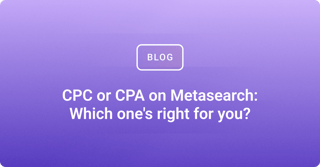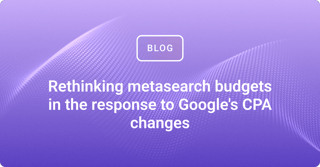Google is ending commission-based metasearch models (CPA) for hotels. All commission bid strategy campaigns will be turned off on October 31st 2024, but don’t panic - there are other ways to ensure visibility and bookings. We’ll take you through the top five options in this blog. Alternatively, you can watch Triptease's Performance Marketing Director, Nigel Haig, discuss these options in the video clip below.
Want to know more about why Google is removing CPA models for hotels? Read the blog here.
Five alternative options for hotels on CPA models
1. Cost-per-click (CPC) bidding
This involves setting a maximum bid you're willing to pay for a click, such as $1.50. You pay for the ad spend and the clicks it generates, rather than bookings. Management and optimization of these campaigns can be manual or automated.
Pros:
- More direct control: You can control the maximum bid for each click, allowing for more precise budget management across different types of Google inventory.
- Flexibility: It offers the flexibility to adjust bids for specific campaigns based on performance, seasonality or special promotions.
- Ability to generate an immediate traffic boost: By setting competitive bids, you can immediately increase visibility and drive traffic to your hotel’s website, which is beneficial for new or time-sensitive campaigns.
Cons: - Risk of non-conversion: Paying for clicks does not guarantee bookings, potentially leading to a wasted budget if your hotel website offers a poor guest experience or rates that are not competitive enough.
- More resource intensive: To be effective, CPC campaigns require regular monitoring and adjustment to ensure bids remain competitive without overspending.
- Potential for high upfront ad spend: Bidding on metasearch is highly competitive, leading to higher costs per click, which might not always justify the returns in terms of bookings.
2. Target return on ad spend (tROAS) in Metasearch
This still operates within the CPC bidding framework but introduces automation to the bidding process. For a more hands-off approach, you set a target ROAS, say 7X or 12X, and Google automatically adjusts your bids across its ad inventory to meet your specified return. You can learn more about tROAS in this blog.
Pros:
- Outcome-focused: Directly aligns advertising spend with revenue goals, ensuring the campaign is aimed at profitability.
- Beginner-friendly budget allocation: Google automatically optimizes bids in metasearch to meet the target ROAS, ideal for hoteliers who lack the data and skills to manually run campaigns.
- Less active management required: Once the target ROAS is set, the platform adjusts bids automatically to achieve the goal, reducing the need for constant campaign adjustment.
- Advanced machine learning and automated optimization: Google’s advanced machine learning in Performance Max automatically optimizes bids and adjusts targeting and placements to efficiently meet tROAS goals, reducing manual effort.
Cons:
- Dependency on accurate conversion tracking: The effectiveness of a tROAS campaign depends on accurate conversion tracking. If conversion tracking is set up incorrectly, it can lead to misguided bidding decisions.
- Risk of non-conversion: Paying for clicks does not guarantee bookings, potentially leading to wasted budget if your hotel website offers a poor guest experience or rates that are not competitive enough.
- May limit traffic: Since the focus is on achieving a specific return, the algorithm might limit exposure to lower-cost clicks that have a slower probability of conversion, potentially missing out on broader marketing objectives like brand awareness.
- Learning period: Google’s algorithm typically requires a learning period to understand how to best achieve the target ROAS, during which performance might be volatile.
- Complexity: Setting up and understanding tROAS campaigns can be more complex than CPC bidding, requiring a good grasp of how bid automation works and how to set up realistic targets based on historical data and market conditions.
3. Target return on ad spend (tROAS) in Performance Max
Performance Max integrates your hotel ads into Google's broader advertising ecosystem, including Search, Display, YouTube, Gmail, Maps, Travel, and Discover. This option not only targets a desired ROAS but also expands your reach across multiple channels, maximizing visibility and potential bookings. You can learn more about Performance Max in this blog.
Pros:
- Broad reach across channels: Performance Max campaigns allow you to access all of Google’s inventory from a single campaign. Given how complex a guest journey can be, this broad reach can help maximize visibility and conversions.
- Automated optimization: By focusing on tROAS in Performance Max, the campaign automatically adjusts bids, targeting and ad placements based on conversion data, reducing the need for manual intervention and constant campaign adjustments.
- Highly targeted advertising: Performance Max campaigns use audience signals and conversion data to identify and target users most likely to convert, potentially increasing the effectiveness of the advertising spend.
- Simple campaign management: By consolidating multiple campaign types into one, you can manage your campaigns more easily, focusing on strategic decisions rather than the complexities of individual campaign types.
Cons:
- Requires accurate conversion tracking: For tROAS to work effectively, conversion tracking must be set up correctly. Inaccurate tracking can lead to poor optimization decisions and wasted ad spend.
- Risk of non-conversion: Paying for clicks does not guarantee bookings, potentially leading to wasted budget if your hotel website offers a poor guest experience or rates that are not competitive enough.
- Learning period: Performance Max campaigns, especially with a tROAS goal, require a learning period during which the algorithm gathers data on what works best. During this time, performance may be volatile, and the desired tROAS may not be immediately achieved.
- Less control and visibility over individual channels: While the automation and machine learning aspects offer efficiency, they also mean less direct control over where and how ads are shown. If you’re used to fine-tuning campaigns for individual channels you may find this lack of control challenging.
- Dependency on machine learning: The success of a tROAS campaign heavily depends on the effectiveness of Google's machine learning algorithms. In some cases, the algorithms might not fully understand the nuances of specific businesses or market changes in real time.
- Minimum conversion volume: tROAS bidding strategies require a certain volume of conversions to optimize effectively. Newer or smaller advertisers with fewer conversions might find it challenging to use tROAS effectively from the start.
4. Opt out of paid metasearch
You could choose to discontinue paid metasearch campaigns on Google altogether, and focus instead on the free listing. You’ll still be visible on Google but will get fewer bookings from it.
Pros:
- Cost savings: The immediate benefit is a reduction in marketing expenses. Savings could be allocated to other business areas or marketing channels with potentially higher ROI or in need of more focus.
Cons:
- Decreased visibility in a highly competitive channel: While paid and free metasearch results typically appear above organic search results, paid listings often have priority over free listings within the metasearch module itself. Opting out of paid campaigns can, therefore, result in lower visibility compared to OTAs who will still be paying to win your customers’ bookings.
- Losing out to OTAs: More of your bookings will come via OTAs who will charge a very high commission
- Loss of customer data: Losing direct bookings also means not having access to customer data, which can be essential for upsells and retargeting campaigns.
- Potential missed opportunities during peak periods: Paid metasearch can be particularly valuable during high-demand periods, where increased visibility can capture more bookings. Without this tool, hotels are likely to miss out on maximizing revenue during these critical times.
5. Work with a vendor still offering CPA
Google is moving away from CPA bidding, but some vendors - including Triptease - will continue to offer similar services. However the number of vendors is expected to decrease once Google ends CPA bidding.
Pros:
- Risk-free: No upfront ad spend and pay on stay. This can be more financially reassuring than spending on clicks that may not convert, ensuring marketing dollars are spent on actual results.
- Continued access to familiar bidding strategies: For hoteliers who have found success with CPA bidding models, the ability to continue using a familiar strategy can ensure stability in their marketing efforts and allow for predictable budgeting based on actual acquisitions rather than clicks or impressions.
Cons:
- Existing vendors may not be able to match Google’s performance: Performance may be at risk if vendors can’t match Google's bidding and cash flow.
- Vendors may increase costs: Vendors could potentially increase costs as they no longer rely on Google’s guarantee.
Triptease Metasearch outperforms Google and offers a commission model

Triptease’s industry-leading Metasearch product will continue to offer a CPA model.
With Triptease Metasearch you get:
- More than five years of experience building AI-powered bidding models.
- Game-changing functionality like Price Match which allows hoteliers to win on metasearch every time by applying small, controlled discounts automatically when they’re being undercut by OTAs.
- The ability to utilize unique hotel data that Google doesn't access allows us to tailor our algorithms based on extensive global hotel data, enabling Triptease Metasearch to consistently outperform Google's algorithms.
Interested in learning more about Triptease Metasearch? Get in touch with the team today via the form below.
Megan is the Product Marketing Executive for Targeted Messages.
![[WATCH] The Future of Google Travel](https://www.triptease.com/hs-fs/hubfs/Resources%20-%20feature%20images/Feature-Image_%5B%5BWATCH%5D%20The%20Future%20of%20Google%20Travel%5D.png?width=320&height=320&name=Feature-Image_%5B%5BWATCH%5D%20The%20Future%20of%20Google%20Travel%5D.png)

![[Video] What is commission bidding (CPA) and why is Google removing it?](https://www.triptease.com/hs-fs/hubfs/Resources%20-%20feature%20images/Feature-Image_%5B%5BVideo%5D%20What%20is%20commission%20bidding%20%28CPA%29%20and%20why%20is%20Google%20removing%20it_%5D.png?width=320&height=320&name=Feature-Image_%5B%5BVideo%5D%20What%20is%20commission%20bidding%20%28CPA%29%20and%20why%20is%20Google%20removing%20it_%5D.png)


![[Video] What is Target Return on Ad Spend (tROAS)?](https://www.triptease.com/hs-fs/hubfs/Resources%20-%20feature%20images/Feature-Image_%5B%5BVideo%5D%20What%20is%20Target%20Return%20on%20Ad%20Spend%20%28tROAS%29_%5D.png?width=320&height=320&name=Feature-Image_%5B%5BVideo%5D%20What%20is%20Target%20Return%20on%20Ad%20Spend%20%28tROAS%29_%5D.png)

![[Webinar] Google kills CPA: How hotels can still win on metasearch](https://www.triptease.com/hs-fs/hubfs/Resources%20-%20feature%20images/Feature-Image_%5B%5BWebinar%5D%20Google%20kills%20CPA_%20How%20hotels%20can%20still%20win%20on%20metasearch%5D.png?width=320&height=320&name=Feature-Image_%5B%5BWebinar%5D%20Google%20kills%20CPA_%20How%20hotels%20can%20still%20win%20on%20metasearch%5D.png)
